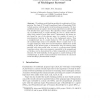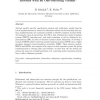169 search results - page 1 / 34 » Comparing the Expressive Power of Well-Structured Transition... |
CSL
2007
Springer
13 years 8 months ago
2007
Springer
We compare the expressive power of a class of well-structured transition systems that includes relational automata, Petri nets, lossy channel systems, and constrained multiset rewr...
FOSSACS
2011
Springer
12 years 8 months ago
2011
Springer
To the best of our knowledge, we characterize for the first time the importance of resources (counters, channels, alphabets) when measuring expressiveness of WSTS. We establish, f...
ERSHOV
2006
Springer
13 years 6 months ago
2006
Springer
Abstract. We address model checking problem for combination of Computation Tree Logic (CTL) and Propositional Logic of Knowledge (PLK) in finite systems with the perfect recall syn...
LATA
2010
Springer
13 years 3 months ago
2010
Springer
We apply language theory to compare the expressive power of models that extend Petri nets with features like colored tokens and/or whole place operations. Specifically, we conside...
JLP
2008
13 years 4 months ago
2008
models, used for specification, analysis and verification, usually describe sets of implementations by means of a refinement relation. In the branching time setting, implementatio...


